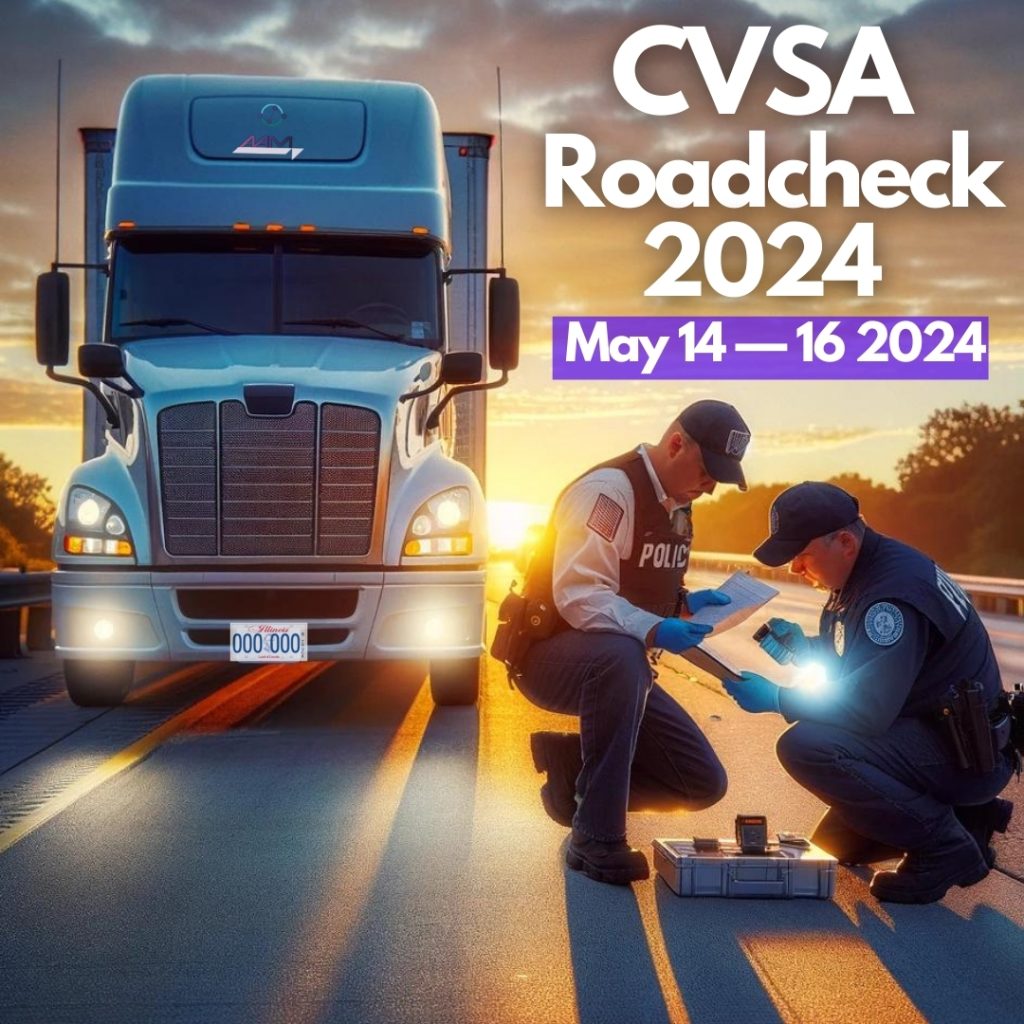Ready for Roadcheck 2024?
With Roadcheck 2024 fast approaching, now is the time to audit your compliance practices. Ensure your fleet is Roadcheck-ready and operating safely and efficiently by leveraging expert compliance solutions.

As the Commercial Vehicle Safety Alliance (CVSA) gears up for its annual International Roadcheck this May 14-16, 2024, businesses across North America are reminded of the critical importance of vehicle and driver compliance. This 72-hour inspection blitz targets commercial vehicles to ensure they meet stringent safety standards.
Historically, the Roadcheck initiative has focused on various safety aspects, from anti-lock braking systems (ABS) to cargo securement. This year, the spotlight is on preventing controlled substance and alcohol use among drivers, ensuring tractor protection, and checking anti-bleed back systems, aiming to enhance road safety across the continent.
Despite strict federal regulations against substance and alcohol use among commercial drivers, over 158,000 drivers are currently flagged in the FMCSA Clearinghouse for violations. With a heightened focus on these issues, businesses must prioritize compliance to avoid hefty fines and ensure their drivers and vehicles are roadworthy.
Maximizing Safety and Compliance: What to Anticipate
During the CVSA Roadcheck, inspectors will utilize the Commercial Vehicle Information Exchange Window (CVIEW) to select vehicles for inspection. These inspections are comprehensive, examining critical components such as tires, brakes, and lights, alongside driver credentials and adherence to drug and alcohol regulations.
Non-compliant vehicles will face out-of-service orders, while compliant ones will earn a CVSA decal, signaling a three-month reprieve from additional inspections. This emphasizes the importance of regular vehicle maintenance and driver education on compliance standards.
Critical Compliance Areas to Watch
- DOT Medical Certificates: Ensure all drivers possess up-to-date medical certificates to avoid common compliance violations.
- CDL Violations: Use the Commercial Driver’s License Information System (CDLIS) for pre-employment screening and keep track of CDL expirations with automated systems.
- FMCSA Clearinghouse Compliance: Prepare for Roadcheck by conducting Clearinghouse queries on your drivers to identify any violations that could impact their eligibility to operate commercial vehicles.
Leverage Technology for Compliance
Automated compliance solutions, streamline the management of medical certificates, driver files, and FMCSA Clearinghouse queries. Such technology is instrumental in ensuring your fleet remains compliant, reducing the risk of out-of-service orders and fines.
2023 Roadcheck Recap and the Path Forward
Last year’s Roadcheck saw over 59,000 inspections, with thousands of vehicles and drivers placed out of service for various violations, highlighting the ongoing need for stringent compliance practices. As we approach the 2024 Roadcheck, it’s crucial for businesses to review and reinforce their compliance measures, ensuring their fleets are prepared for scrutiny.
Conclusion
The CVSA International Roadcheck serves as a vital reminder of the importance of commercial vehicle and driver safety. By focusing on key compliance areas and utilizing technology to streamline processes, businesses can enhance road safety and navigate the Roadcheck period successfully.
Enhanced Conclusion: Essential Aspects of the CVSA’s Driver Inspection Process
During the comprehensive North American Standard Level I inspections, CVSA inspectors will meticulously evaluate several critical aspects of driver compliance and vehicle safety. Key areas of focus include:
- Seat Belt Compliance: Inspectors will verify that all occupants of the commercial motor vehicle, including drivers, passengers, and co-drivers, are properly secured with fastened seat belts.
- Driver Health and Readiness: Observations will be made regarding the driver’s physical and mental condition, looking for any signs of illness, fatigue, or impairment that could compromise safety.
- Unauthorized Passengers: The presence of any passengers not authorized to be in the vehicle will be checked.
- Prohibition of Alcohol and Controlled Substances: A thorough search for illegal alcohol, drugs, or other contraband will be conducted to ensure compliance with safety regulations.
- Medical and Skill Certifications: The validity of the driver’s medical examiner’s certificate and any applicable skill performance evaluation certificates will be verified. Additionally, inspectors will check for any necessary corrective lenses, hearing aids, or other indicated physical limitations.
- Documentation and Duty Status: Drivers must have their record of duty status and all supporting documents readily available. Those using electronic logging devices (ELDs) must demonstrate proficiency in their operation and be prepared to transmit records as required, ensuring their hours of service are accurately recorded and compliant.
- Exemption Documentation: For drivers operating under exemptions, it is advisable to have printed proof of such exemptions ready for inspection to facilitate a smooth process and verify that all criteria are met.
- License Verification: The inspection will include a review of the driver’s license or commercial driver’s license (CDL), focusing on expiration dates, class, endorsements, restrictions, and overall status. Specifically, vehicles operated by commercial learner’s permit holders must be accompanied by a valid CDL holder who is fully qualified to operate the vehicle.
- FMCSA Clearinghouse Queries (U.S. Only): In the United States, inspectors will access the FMCSA’s Drug and Alcohol Clearinghouse to confirm there are no suspensions or cancellations affecting the driver’s license.
By highlighting these inspection elements, businesses can better prepare their drivers for the CVSA Roadcheck, ensuring that both drivers and vehicles meet or exceed the rigorous safety standards set forth by the CVSA and regulatory bodies, ultimately promoting safer roadways for everyone.

